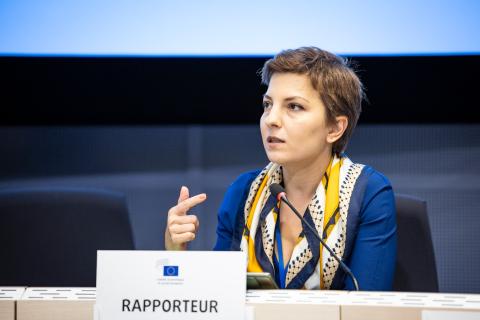European Economic
and Social Committee
Strengthening EU integration for greater competitiveness
In two new opinions adopted at its October plenary session, the European Economic and Social Committee (EESC) calls for key reforms to strengthen the competitiveness of the EU economy, based on sustainable growth and a balanced fiscal approach to supporting green and digital investments. The EESC underlines the key role of NextGenerationEU, the EU’s COVID-19 recovery instrument, and calls for similar instruments to be included in the new long-term EU budget.
The EU economy has shown strong resilience to the geopolitical shocks over the past two years, primarily driven by the ongoing war in Ukraine, which has intensified the volatility in energy markets. Yet, Europe’s challenges may be far from over as global economic fragmentation deepens, fuelled by protectionist policies. In an opinion entitled Additional Considerations on Euro Area Economic Policy 2024,, the Committee urges the EU to strengthen fiscal coordination, and complete the European financial union. This step, the EESC argues, would strengthen Europe’s resilience to external shocks and enable it to better exploit its financial and economic potential.
Strengthening the foundations of the monetary union
One of the most urgent tasks identified by the EESC is the completion of the Capital Markets Union. This project has been under discussion in EU countries for about a decade, and yet European investors are still migrating to markets outside the Union, notably in the United States. European money invested there facilitates the financing of American entrepreneurs, while the European Union – as Mario Draghi recently pointed out in his report on The future of European competitiveness – suffers from an investment gap of 4.7% of EU GDP (in private and public investment), which is hampering EU innovation and competitiveness vis-à-vis the US and China.
An important complement to the efforts needed in creating deeper and less fragmented European capital markets is the completion of the Banking Union by eliminating regulatory disparities between EU Member States and creating a common deposit guarantee scheme. 'An incomplete Banking Union poses risks to the financial stability of the EU, including in the euro area', explains rapporteur Petru Sorin Dandea. 'And it perpetuates financial fragmentation, preventing the efficient mobilisation of financial resources, in particular for common and major infrastructure projects at EU level.'
EU should consider new common fiscal instruments
More than 20 years after the introduction of the euro, the monetary union is still confronted with wide disparities in economic performance between its Member States, which not only burdens people, but also creates political tensions and reduces the effectiveness of the common monetary policy. The EESC therefore calls for an action plan to speed up upward convergence between the Member States. Closer coordination of national budgetary policies is essential and cohesion policy must remain at the heart of the Multiannual Financial Framework (MFF), the EU’s long-term budget, beyond 2027.
The EESC argues that instruments such as NextGenerationEU are essential for future stability and recommends the inclusion of similar tools in future EU financial frameworks, as well as a discussion on the possibility of new common fiscal instruments. In a second opinion, entitled Additional considerations on the Annual Sustainable Growth Survey 2024, the EESC urges faster implementation of the Recovery and Resilience Facility (RRF) and recommends extending the deadline and enhancing technical support to ensure that the funds are fully absorbed and have the maximum impact.
Rapporteur Elena-Alexandra Calistru: 'The strong involvement of social partners, civil society organisations and local and regional authorities in the implementation and evaluation of RRF projects, as advocated by EESC, should help to achieve this'. The current deadline for RRF payments is 2026, but there is growing concern in some EU Member States that they will not be able to absorb all the funds within this timeframe.
Clean Industrial Deal and Competitiveness Fund
The EESC calls for the prompt implementation of the proposed Clean Industrial Deal and the European Competitiveness Fund and underlines the urgent need to invest in European public goods such as R&D, digital infrastructure and green technologies. It points out that more than 20% of the EU’s working-age population is inactive, including 8 million young people who are not in employment, education or training (NEETs). Tackling these negative labour market issues is essential for restoring the EU’s competitiveness.
Furthermore, the EESC calls for a prudent and nuanced fiscal policy that balances the need to promote debt sustainability with the need to sustain essential investments, in particular in the green and digital transitions, to promote long-term sustainable growth while ensuring fiscal responsibility. This is the only way to ensure the sustainable and socially inclusive development of the EU and to build the strategic autonomy of the EU that the EESC advocates.
